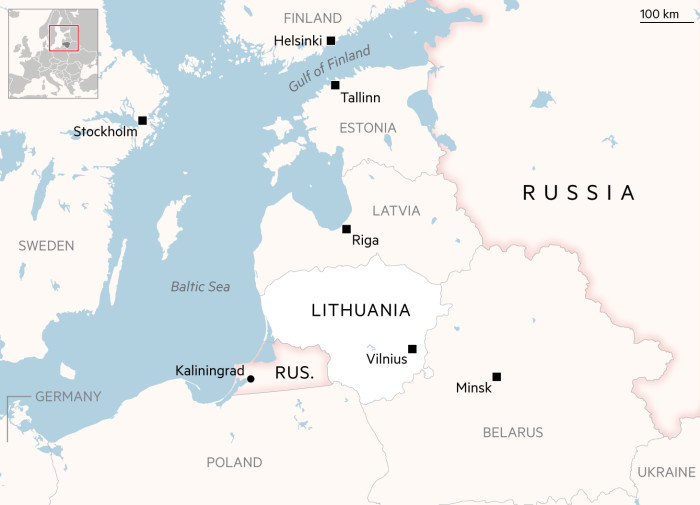The EU has sought to reduce tensions with Moscow over Kaliningrad by indicating it was not seeking to block shipments of sanctioned goods from reaching the Russian territory.
The move follows weeks of talks within the EU over how rigorously to enforce sanctions on Russian products destined for Kaliningrad, a Russian exclave sandwiched between Poland and Lithuania on the Baltic Sea.
Lithuania, which controls the only overland rail route linking the exclave to mainland Russia via Belarus, has been carefully checking the shipments, triggering a furious response from Moscow, which accused the EU of imposing a “blockade” on the territory.
The European Commission released guidance on Wednesday confirming that the bloc was not attempting to stop goods transported by rail from travelling across Lithuania to reach Kaliningrad, subject to checks to ensure that trade volumes were in line with historical averages.
However, goods that are subject to EU sanctions, such as steel and cement, would not be allowed to travel by road, it said. Sanctioned military and dual-use goods and technology are fully prohibited regardless of the mode of transport.
Some EU officials have privately criticised the scale and intensity of Lithuania’s checks on Russian trains, fretting that they could create a dangerous stand-off with Russia in a geopolitically sensitive part of Europe.
Russian foreign ministry spokeswoman Maria Zakharova said the EU’s decision was “a display of realism and common sense”, though she added “we still have questions about the content of the document in question”. Russia would “set up thorough monitoring of how the EU’s steps will be carried out in practice”, Zakharova said.

Some diplomats say they did not intend to create significant new barriers to flows of goods between Russia and its Baltic exclave when they endorsed the sanctions this year and that the commission had drafted the rules ambiguously.
“Kaliningrad is a politically sensitive issue, so it was a mistake by the European Commission,” said one EU diplomat.
The commission said the guidance was part of “regular technical exchanges on the practical implementation of EU restrictive measures”.
Lithuanian policymakers have insisted they have correctly implemented EU sanctions against Russia and have avoided unilateral measures, denying there has been any “blockade” of the exclave. In its guidance the commission said checks by the member states’ authorities should be “targeted, proportionate and effective”.
The EU has pushed through six rounds of sanctions in retaliation for Russia’s invasion of Ukraine, which will affect a growing range of products as each round takes effect. Under Wednesday’s commission guidance, member states are required to look out for unusual trade patterns or flows that might indicate circumvention of sanctions.
The intervention by Brussels came as diplomats began consultations on a fresh round of EU measures aimed at closing loopholes in the sanctions regime. The rules are likely to include sanctions on Russian gold following a G7 agreement this month, diplomats said, as well as potentially further listings of individuals. The EU aims to approve the package next week.
The US state department welcomed the commission’s making clear how sanctions measures were to be implemented.
Spokesman Ned Price said: “It is important to note that there is not now and there never has been a so-called ‘blockade’ of Kaliningrad. Using a variety of routes, passengers continue to transit between mainland Russia and Kaliningrad, as do all humanitarian shipments and most other goods.”
https://news.google.com/__i/rss/rd/articles/CBMiP2h0dHBzOi8vd3d3LmZ0LmNvbS9jb250ZW50LzcxNjlhMGYzLWM4MzgtNGVjNC05MmEzLTBhMWFiZTAxZjZiMNIBAA?oc=5
2022-07-13 13:50:05Z
1491722680
Tidak ada komentar:
Posting Komentar